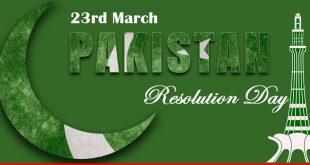The Lahore resolution which is more commonly known as the Pakistan resolution was a political statement, which the Muslim League adopted back in 1940. The three-day session took place between March 22-24 was held to call for Muslim autonomy within British India. The resolution was presented by A. K. Fazlul Huq and was interpreted to be a demand by the Muslim League for a separate nation for the Muslims i.e. Pakistan. While Muhammad Ali Jinnah and other leaders believed and held Hindu-Muslim unity to be of great importance, due to the ongoing political climate, which was creating tension and religious hostilities gave this idea of a separate nation a strong backing.
During the speech on this monumental day, Muhammad Ali Jinnah spoke about the current situation between the Hindus and the Muslims and stressed that the problems within India were no longer of an inter-communal nature and rather were now international in nature. In his speech, he also criticized the Congress party and the nationalist Muslims and proposed the Two-Nation Theory along with his reasons as to why he believed that a separate homeland for the Muslims was required. It is suggested that it was at this time that Jinnah truly transformed into a great leader, one who was an ambassador for Hindu-Muslim unity but was not working towards the greater good of the Muslims by obtaining a new homeland for them, which was to be called Pakistan.
Once the Lahore Resolution was presented by Sikandar Hayat Khan, the then Chief Minister of Punjab, the Muslim League unanimously rejected that Hindu’s and Muslims live together in United India on the grounds that inter-communal violence was on the rise and thus recommended that an independent Muslim state be created.
For Jinnah, the differences between the two communities were too great and risky for them to be able to live in union under the command of one central government. Hindus and Muslims belonged to separate nations and the only chance of bringing peace back between the two were to opt for a separate state.
In the words of our founding father Muhammad Ali Jinnah, “Hindus and Muslims belong to two different religions, philosophies, social customs and literature. They neither inter-marry nor inter-dine and indeed they belong to two different civilizations that are based mainly on conflicting ideas and conceptions. Their concepts on life and of life are different. It is quite clear that Hindus and Muslims derive their inspiration from different sources of history. They have different epics, different heroes and different episodes. Very often the hero of one is a foe of the other, and likewise, their victories and defeats overlap. To yoke together two such nations under a single state, one as a numerical minority and the other as a majority, must lead to growing discontent and final destruction of any fabric that may be so built up for the government of such a state.”
Once the Pakistan Resolution was adopted, Jinnah had a clear goal ahead of him and began his struggle to achieve it. He knew that the nation he was aiming to create would contain a large number of populations, having their own distinct culture, language, art, architecture, laws, moral codes, customs, history, aptitudes, ambitions and traditions. He believed that as Muslims, they had a very different outlook on life and that because of this, they were one nation.
In 1945, just 2 years before Pakistan gained independence, Jinnah stated that the Muslim League was the only party which represented Muslims and such a proclamation allowed the part to win 100% of the seats at the Center in the 1946 polls and 80% in the provinces. Such a win brought about greater shock for the Congress and their claims of being the only national body.
With the kind of charismatic personality Jinnah had and the hard work being put in by all members of the League, the dream of a separate homeland was brought into reality on the 14th of August, 1947. Despite a great deal of opposition and criticism, the establishment of an entire nation within a span on seven years was certainly an extra ordinary achievement.
When departing from Delhi to Karachi on August 1947, Jinnah left a message for the Hindus stating that, “The past must be buried and let us start a fresh as two independent sovereign states of Hindustan and Pakistan. I wish Hindustan prosperity and peace.”
Even after partition, Jinnah was hopeful of a peaceful relationship between the two states, co-existing non-violently. However this vision of his did not last as the war in Kashmir broke out in 1947, which created ill will and hostility between the two nations, which became and is at present, still an issue. Due to no agreement being reached between the nations regarding the Kashmir dispute, a number of wars and bloodshed have taken place between India and Pakistan.
In 2000, General Pervez Musharraf stated that, “The way should be avoided through a potent deterrence and diplomacy, engaging India on the issue of Kashmir for bringing permanent peace in the region without compromising on sovereignty.”
This peace initiative by president Pervez Musharraf took him to Agra, however, despite the failure of the talks in Agra, he continued to persist and pursue his foreign policy of achieving a peaceful resolution to the dispute with India regarding Kashmir. In order to reciprocate the gesture being made by the Pakistani side, prime minister of India Atal Bihari Vajpayee extended his hand of friendship towards Pakistan. A meeting also took place between the two leaders on the sidelines of the SAARC Summit in Islamabad of 2010, which led to confidence building measures and secretary level talks.
The Kashmir issue is, however, still at large between the two nations and has not been solved to date. Being the major irritant between the two nations, this issue needs to be resolved for peace between the nations and for further benefits of such peace to be taken advantage of.
 PAGE Blog Business Weekly Magazine
PAGE Blog Business Weekly Magazine

